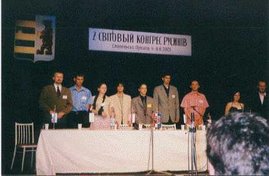 Washington, D.C., May 31, 2007 – A landmark decision of Ukraine’s Transcarpathian Oblast Council on March 7, 2007, officially recognized the Rusyn people as an indigenous nationality of the region. The council members, representing the oblast’s 1.2 million citizens, voted overwhelmingly to respond to the long-standing requests of local cultural and political organizations to acknowledge the existence of a distinct Rusyn nationality in the Transcarpathian (Zakarpatska) oblast. The 90-member council voted as follows: 71 for; 2 against; with 2 abstentions.
Washington, D.C., May 31, 2007 – A landmark decision of Ukraine’s Transcarpathian Oblast Council on March 7, 2007, officially recognized the Rusyn people as an indigenous nationality of the region. The council members, representing the oblast’s 1.2 million citizens, voted overwhelmingly to respond to the long-standing requests of local cultural and political organizations to acknowledge the existence of a distinct Rusyn nationality in the Transcarpathian (Zakarpatska) oblast. The 90-member council voted as follows: 71 for; 2 against; with 2 abstentions. The decision to recognize Rusyns as distinct from Ukrainians means that the oblast must now provide funding for the needs of the Rusyn community in areas of language, culture, and education alongside funding for other nationalities in the region, such as Hungarians, Romanians, Slovaks, Roma, and Germans. The Transcarpathian Oblast of Ukraine, which borders Poland, Slovakia, Hungary, and Romania, is home to over 100 nationalities and peoples.
Rusyns are an East Slavic people living primarily in the Carpathian Mountain region of Slovakia, Poland, Romania, and Ukraine. Sizeable Rusyn communities also exist in Serbia, Croatia, Hungary, Canada, and the United States. Rusyns are officially recognized in all of those countries except for Ukraine.
The territory of Transcarpathia (historic Subcarpathian Rus’) was a semi-autonomous province of Czechoslovakia until after World War II, when Stalin annexed the territory and outlawed the idea of a distinct Rusyn nationality. Rusyns were declared to be Ukrainians, a condition that has continued in independent Ukraine to the present. In spite of the fact that the 2001 Ukrainian census did not include Rusyn as a national category, 10,100 individuals identified themselves as Rusyn rather than Ukrainian. Today Rusyns comprise approximately 65% of the population of Transcarpathia, that is, 800,000-850,000 people.
Paul R. Magocsi, Chairman of the Slovakia-based World Council of Rusyns, remarked, “The decision of the Transcarpathian Oblast Council is a reflection of the success of the Rusyn movement and all those who have worked on behalf of the Rusyn nationality both inside and outside Ukraine.” Magocsi’s enthusiastic reaction was echoed by Rusyn organizations in other countries of central Europe.
Valeriy Padiak, president of the Uzhhorod branch of the Aleksander Dukhnovych Society, a cultural organization of Rusyns, immediately praised the decision as a significant positive step forward. Rusyn organizations in Transcarpathia will now look for government support of Rusyn “Sunday schools,” the establishment of a department of Rusyn language and culture at Uzhhorod National University, support for publications, conferences and celebrations of Rusyn traditional culture, Rusyn programs on television and radio, and the introduction of Rusyn language and history as elective subjects in public schools.
Local Rusyn leader and deputy to the Transcarpathian Oblast Council Ievhen Zhupan welcomed the recognition, stating that since 1992 the Oblast Council has requested the recognition of Rusyns as a distinct nationality in Ukraine four times, adding, “Unfortunately, today Ukraine is still the only country where Rusyns have no official status.” He called attention to the fact that Rusyns and Rusyn organizations supported democratic change in Ukraine during the Orange Revolution. According to Zhupan, “Transcarpathians will continue to build up their region, support their country of Ukraine, love their native land, and live in peace with others, regardless of their ethnic background.”
The Oblast Council has said that it will refer the matter of nationwide recognition of Rusyns in Ukraine to Ukraine’s national parliament (Verkhovna Rada), requesting that the parliament take the final step in the matter and legally recognize the existence of the Rusyn people countrywide. Such nationwide recognition would demonstrate Ukraine’s commitment to democratic principles and conformity with European norms.








No comments:
Post a Comment